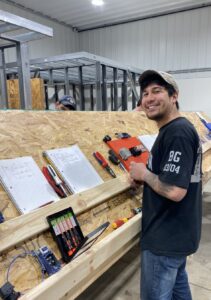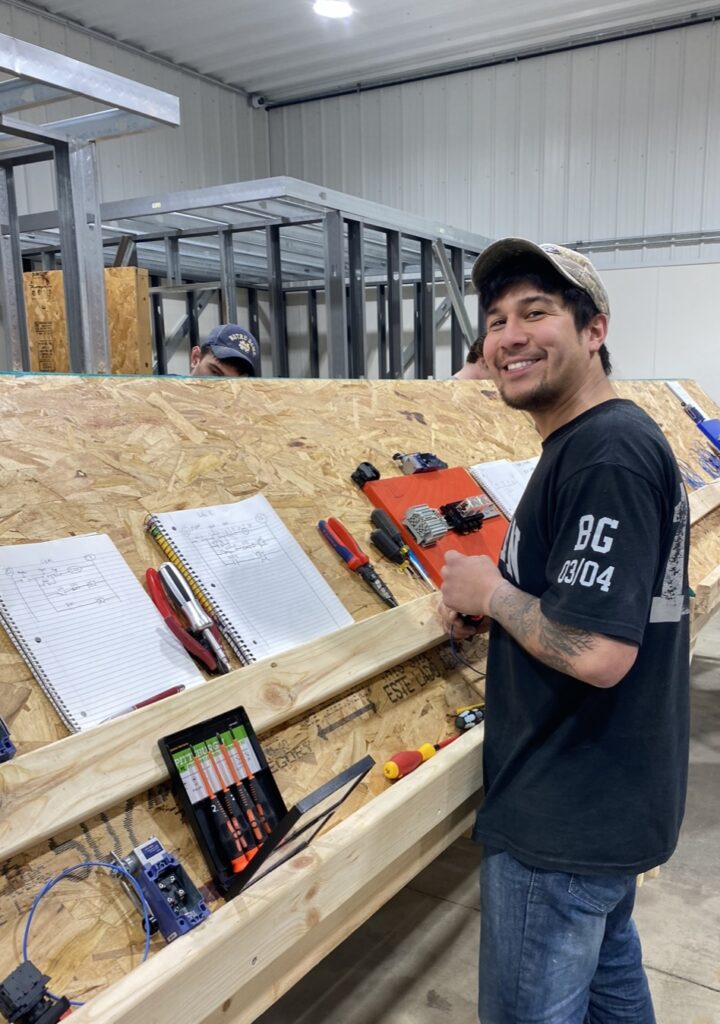Zach Mroczkowski was doing just fine. He had been working in a local fine dining restaurant and had moved from bus boy to banquets to serving to bartending. He was 22.
“I was looking around at some of my fellow workers, some in their forties, and thinking about whether I wanted to be dependent upon customer tips my entire life,” he says. “I liked the customer service aspect of my job but thought I would like a bit more control over my future.”
A family friend owned an electrical business and was part of the IEC. He asked Zach if he was interested in doing something a bit different. Zach left the restaurant and began working at Lansing Electric.
“I took a pay cut to start over at Lansing but it has definitely paid off,” Zach explains. “I worked there a couple of years before entering the IEC Midwest apprenticeship program to determine whether it was best for my career. I wanted to be sure I was cut out for this field. Also, many had advised going the union route so I didn’t want to start a merit shop apprenticeship and then decide to go union and have to start over.”
It was seeing the incredible knowledge and skills of an IEC-trained new hire at Lansing that convinced Zach IEC was the way to go. Zach says he saw a real difference in knowledge and training in his colleague from Texas.
“I saw how intelligent he was and how he was able to troubleshoot everything,” Zach says. “It made me want to be a better electrician. My friend told me ‘I am able to understand all this stuff because I went to school, and I really think that you should too.’”
Zach believes his extra years of experience on the job helped him when he started school. Theory, code, technique made a bit more sense to him than some of the other first years as he had more on-the-job experience to put classroom learning into context immediately. Zach just completed his third year in the IEC Apprenticeship Program.
He also says that classes help him to see to breadth of the electrical field. Lansing Electric traditionally has done mostly residential with a smattering of commercial and industrial. So, learning about motor controls and ladder diagrams in class opens his eyes to other areas.
Recently, however, Zach says the company is doing a lot more commercial and remodels.
“The previous three years it was constant new construction with all the people moving from Illinois to Indiana,” he says. “We were roughing a house and setting the service and pipe work. I feel very fortunate to have that experience as piping a house is three times harder than piping a commercial building which has mostly straight runs. When you’re piping a house, you have to work with what the other trades have already done as HVAC and plumbing most often go in before electric.”
 Being more experienced than other first year apprentices initially caused Zach some angst as, of course, the other students had yet to have much experience with hands on and using tools. He’d say to himself, ‘man, I could do this lab a whole lot faster if I was working on my own.’ He chose to turn that into a positive.
Being more experienced than other first year apprentices initially caused Zach some angst as, of course, the other students had yet to have much experience with hands on and using tools. He’d say to himself, ‘man, I could do this lab a whole lot faster if I was working on my own.’ He chose to turn that into a positive.
“It teaches you patience and how to coach a person through the task,” he says. “It makes it a better experience for them and I’ve always been happy to share whatever knowledge I can. I’d tell them ‘Here’s how people better than me showed me how to do it. I hate to see you struggling; there’s no need to smash your head against the wall trying to figure it out yourself.’”
Zach hopes to someday have his own electrical contracting business. He knows it would be a lot more responsibility but the idea of working for himself would be worth taking the plunge.
“They call me the ‘side job guy’ at Lansing,” Zach says. “I never step on toes and put my Lansing Electric work first. In fact, unless it’s a job for a family member, I always run any opportunity by my boss. I would not take work for myself that it appropriate for the company.”
Zach knows he is in a field that will always have work. He loves what he does and would encourage young people to consider a career in the trades.
“People are always going to need electricians and other trades as well,” he says. “I have skills that provide job security and have a sense of fulfillment that I created this; I did this with my own hands. It’s very gratifying. I’d tell anyone who asks that they should go to IEC school and learn to think; don’t just be an installer. Become a leader on the job site where others know they can come to you with questions and you know you can answer them with confidence.”


